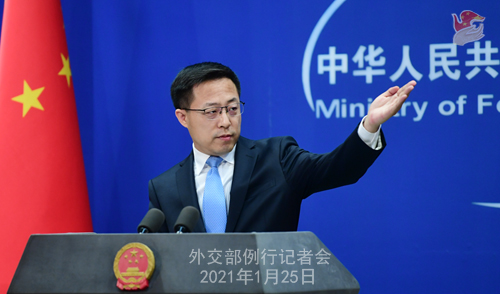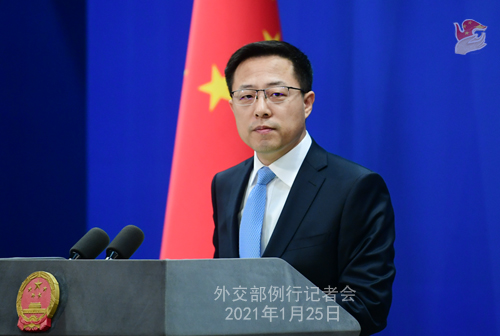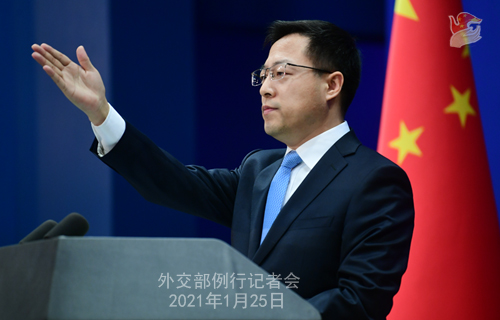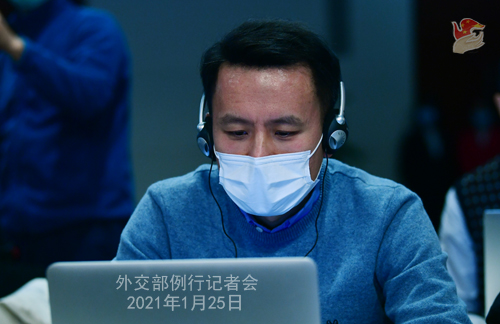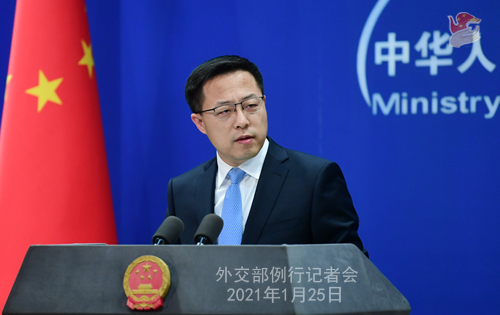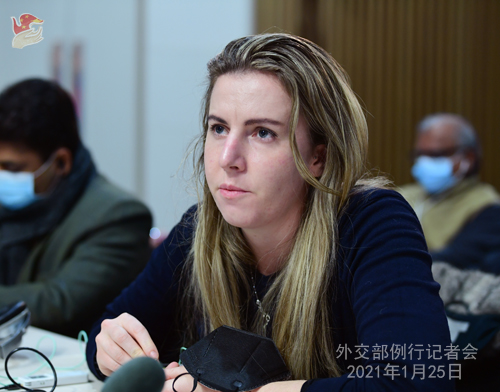| Foreign Ministry Spokesperson Zhao Lijian's Regular Press Conference on January 25, 2021 |
| 2021-01-25 20:20 |
|
CCTV: Gregory Gilligan, Chairman of AmCham China, said in a recent interview that the history since the establishment of diplomatic relations between China and the United States over 42 years ago has sufficiently proved that we can and should work together and co-exist with each other peacefully. The whole world stands to benefit from this. Survey on almost 1,000 AmCham members showed that 70 percent of respondents have no plans to relocate their businesses from China, and "as AmCham China, we can use commerce as a ballast stone for the larger picture of China and the United States." What is your comment? Zhao Lijian: Recently, the US business community has repeatedly signaled their optimistic attitude towards China's economic prospects, saying that they are willing to stay in China and rejecting the "decoupling" between the two economies. Mr. Gilligan's words once again show that the essence of China-US economic and trade relations is mutually beneficial, and that China and the United States have a wide range of common interests and huge room for cooperation. Cooperation used to be the main tone of China-US relations, and it should continue to be so in the future. China will, as always, build a market-oriented, law-based and international business environment. We welcome the US business community to invest and start business in China, and support enterprises of the two countries in strengthening mutually beneficial cooperation. We also hope that the new administration of the United States can bear in mind the fundamental interests of the two peoples and the common well-being of the international community, follow the path of openness, inclusiveness, mutual benefit and win-win cooperation, focus on cooperation, manage differences, and work with China to bring China-US relations back on the right track, create a favorable atmosphere for the healthy development of China-US economic and trade cooperation, and improve the well-being of both peoples. Macao Monthly: According to reports, the USS Theodore Roosevelt aircraft carrier entered the South China Sea via the Bashi Channel. U.S. reconnaissance aircraft and early warning aircraft also flew near the Taiwan region. What's your response? Zhao Lijian: It does no good to regional peace and stability for the United States to frequently send military vessels and aircraft to the South China Sea to show off muscles.
HKSTV: First question, the Wall Street Journal reported last Friday that Ambassador Cui Tiankai wrote in his letter to the U.S. side that Yang Jiechi, Member of the Political Bureau of the CPC Central Committee and Director of the Office of the CPC Central Commission for Foreign Affairs, will visit the United States, but the Chinese embassy later denied this. Is there any possibility for China and the United States to resume high-level exchanges in the near future? Second question, Ambassador Cui Tiankai has had this post for eight years, while the post of American Ambassador to China has been vacant since last year. Does China have new considerations with regard to the rotation of the Chinese Ambassador to the United States? Zhao Lijian: Regarding China-U.S. relations, as President Xi said to President Biden in his congratulatory message, the sound and stable development of China-U.S. relations serves not only the fundamental interests of the Chinese and American people, but also the common aspiration of the international community. We hope both sides can follow the spirit of non-conflict, non-confrontation, mutual respect and win-win cooperation, focus on cooperation, manage differences, work for progress in the sound and stable China-U.S. relations, and join hands with all countries and the international community in promoting world peace and development, a noble cause for humanity. With regard to the bilateral exchanges you asked about, I have nothing for you at the moment. I don't have any information on whether China will appoint a new ambassador to the United States, either. China's policy on China-U.S. relations has been consistent and clear. Bloomberg: Wall Street Journal says China plans to propose that both the United States and China cooperate on vaccine-certificate protocols, to verify proof of immunization, under the guidelines set by the World Health Organization. China hopes this can help facilitate travel between the two countries for people who present such proof, and Beijing is also hoping the two sides can talk about jointly distributing vaccines in developing countries. What's your comment? Zhao Lijian: I'd refer you to the competent authorities as I have no information on what you asked about. With the pandemic still wreaking havoc around the world, China stands ready to work with the United States and the international community for joint responses, including cooperation on vaccine R&D and supplying vaccines to developing countries as you mentioned, so that the day of final victory against the virus can arrive as early as possible .
NHK: Firstly, the U.S. State Department issued a statement on January 23, urging China to stop pressuring Taiwan and to engage in meaningful dialogue with Taiwan. What is your comment? Secondly, Taiwan media reported that there were more than ten sorties of PLA military aircraft operating in the airspace near Taiwan on January 23 and 24. Taiwan experts said the PLA's move was ostensibly a military exercise, but above all intended as a warning to the United States. What is China's intention? Zhao Lijian: On your first question, China's position on the Taiwan question is consistent and clear. There is but one China in the world, and the Taiwan region is an inalienable part of the Chinese territory. China is determined in safeguarding national sovereignty and territorial integrity, and opposing "Taiwan independence" and interference by external forces. The root cause of the current tension and disturbance in cross-Strait relations lies in the Democratic Progressive Party authorities refusing to recognize the 1992 Consensus which embodies the one-China principle, strengthening contacts with external forces and making provocations in pursuit of "Taiwan independence". On the political basis of adhering to the 1992 Consensus and opposing "Taiwan independence", we stand ready to conduct dialogue and consultation with all political parties, groups and personages in the Taiwan region, so that we can resolve differences and build up consensus on political issues across the Strait and on issues related to promoting the peaceful reunification of China. We urge the U.S. side to earnestly abide by the one-China principle and the three China-U.S. joint communiqués, prudently and properly handle Taiwan-related issues, and refrain from sending any wrong signals to the "Taiwan independence" forces so as to avoid damaging China-U.S. relations and peace and stability across the Taiwan Strait. On your second question, I'll leave it to the Ministry of National Defense. The Paper: Last Saturday, protests in support of the Russian opposition leader Alexie Navalny broke out in various places in Russia. The US embassy in Moscow published a protest timetable and routes in Russian cities and distributed a "demonstration alert" to US citizens in Russia recommending they heighten safety awareness. The Russia Foreign Ministry strongly protested against this, saying what the US embassy did was beyond normal consular protection and was interfering in Russian affairs. "The U.S. colleagues will have to explain themselves." What is your comment? Zhao Lijian: We have noted relevant reports. China consistently opposes external interference in the internal affairs of a sovereign country.
China News Service: In 2020, a total of 530,000 invention patents had been authorized in China, registering a year-on-year growth of 17.1 percent, the National Intellectual Property Administration said on January 22. What's the significance of that figure? Can you tell us more about it? Zhao Lijian: The competent authority already released a detailed readout of the press conference of the National Intellectual Property Administration for the first quarter, and you may check on that. Despite the impact of COVID-19, China saw a surge in authorized invention patents. This epitomizes the rapid improvement of the quality and benefits of China's intellectual property, attests to the outcomes of China's efforts to protect intellectual property and indicates that China is shifting from a major IPR importer to a major creator. The Chinese government has been prioritizing the central role of scientific innovation in national development, implementing the innovation-driven development strategy and IPR strategy, and strengthening innovation and IPR protection. As China has entered a new development stage, it is putting in practice the new development philosophy and formulating a new development paradigm, which would not be possible without the strong support of IPRs. Just as President Xi Jinping pointed out, no country can become an independent innovation center or enjoy fruits of innovation alone; innovation should benefit the world rather than being encaved. China stands ready to work with other countries to strengthen scientific innovation and cooperation, actively participate in global IPR governance, and contribute more to the balanced, inclusive and sustainable development of global IPRs. Global Times: Sources from the Indian government said that India will send 10 million doses of COVID-19 vaccines to South Asian neighbors in the next few weeks, in a move to "rival" China's "vaccine diplomacy", as commented by the media. What is your comment? Zhao Lijian: Virus is an enemy to all mankind. The most pressing task for the international community at the moment is to make united efforts to fight against the pandemic. COVID-19 vaccines should be made a global public good. There are multiple COVID-19 vaccine candidates out there on the market, and countries should be able to make their choices on the vaccines independently. This issue can afford no place for malign competition, let alone the so-called "rivalry". We hope and welcome that more doses of safe and effective vaccines will be manufactured at a faster pace by more countries and then provided to more countries to benefit more people. China is taking solid steps to act on the pledge of "making COVID-19 vaccines a public good". China has been cooperating on this front with other countries, especially developing countries, in various means, and has provided support and assistance in accordance with their needs to the best of our ability. We will continue to promote equitable distribution and application of the vaccines worldwide, so that the benefits can be enjoyed by more people.
Prasar Bharati: India is providing vaccines to many countries, with some free of charge and some commercial exports. Will China consider importing vaccines from India to bridge any sort of gap in the demand and supply? Zhao Lijian: I'm not aware of what you said. I'll leave that to the competent authorities. Phoenix TV: Jessica Bartlett, the Chairperson of the American Chamber of Commerce in Hong Kong, said AmCham has not seen large US capital withdrawals after the national security law took effect. She said companies will make decisions on leaving or staying depending on their development strategy, and many investors still have confidence in the Hong Kong market. What's your response to this? Zhao Lijian: A previous survey by the American Chamber of Commerce in Hong Kong shows that most of its members surveyed will still choose Hong Kong as their regional headquarters in the next three years, and nearly sixty percent of the companies surveyed have or are planning to have business operations in the Guangdong-Hong Kong-Macao Greater Bay Area. Many companies believe the huge consumer market in the Greater Bay Area will provide great opportunities for growing profits. The survey by AmCham and the chairperson's remarks prove once again that the Law on Safeguarding National Security in the Hong Kong SAR is a stabilizing force for Hong Kong's long-term stability, security and prosperity, offering a safer, more stable and sustainable investment environment and a brighter cooperation prospect for international investors including those from the United States, which is a self-evident proof that the previous doubts and baseless assumptions on the national security law are profoundly untrue. Facts have proven and will continue to prove that the national security law contributes significantly to Hong Kong's sound business environment and position as a financial, trading and shipping center. The global business community is welcome to operate and achieve greater success in Hong Kong. PTI: Yesterday the 9th round of China-India commander-level talks was held at the border to ease the situation at eastern Ladakh. Do you have any information about the outcome of the talks? Zhao Lijian: I can confirm to you that a new round of talks was indeed held between China and India. Following our agreement, both sides will release the information as early as possible.
|
| |||||||||||||||
|
|||||||||||||||


